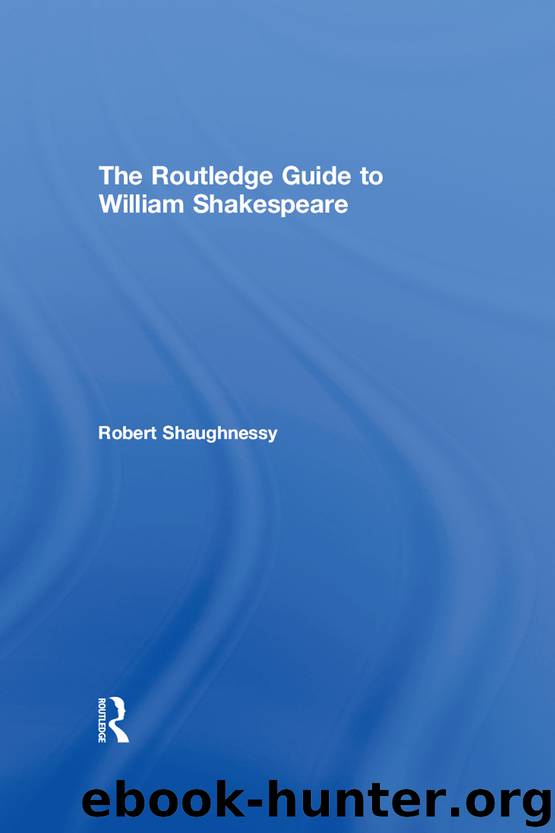The Routledge Guide to William Shakespeare by Shaughnessy Robert;

Author:Shaughnessy, Robert;
Language: eng
Format: epub
Publisher: Taylor & Francis Group
The milk of human kindness
Macbeth's babe is a sibling of a kind to the other significant infant that is mentioned later in the same scene: the child whom Lady Macbeth deploys as an example in the course of her assertion of her murderous determination:
I have given suck, and know
How tender ’tis to love the babe that milks me.
I would, while it was smiling in my face,
Have plucked my nipple from his boneless gums
And dashed the brains out, had I so sworn
As you have done to this.
(1.7.54–58)
The passage has notoriously provoked speculation about the Macbeths’ back story (and has been mined by actors for motivation and clues to their relationship); what concerns us here, however, is its significance as a marker of the gender values of a play in which interpenetrations of masculinity, power, violence and sexuality are insistent. In the context of a world in which to be a man is to be a killer, in which extreme violence is deemed perfectly acceptable as long as it is sanctioned by the state, and in which advancement and advantage routinely secured the violation of one's own and others’ bodily and moral integrity, ‘it is hard to see why … bloodthirsty talk of dashing out babies’ brains is any more “unnatural” than skewering an enemy soldier's guts’ (Eagleton 1986: 6).
Nonetheless, perhaps for the author of this scene, and certainly for many of its commentators, the Lady's subjunctive commitment to infanticide epitomises the unnaturalness of a character who on her first appearance calls upon the spirit world to ‘unsex’ her (1.5.39) in order to ready her for murder, and who, as a steely secularist who scornfully dismisses ‘the eye of childhood/ That fears a painted devil’ (2.2.52–53), successfully overrides the scruples of her conscience-stricken spouse to complete the act of slaughter in Duncan's bedchamber. Such behaviour is ‘unnatural’ because, according to the patriarchal script that the play in some respects appears to follow, it is unwomanly: traditionally associated with the production, preservation and nurturing of life rather than its destruction, women are simply not meant to murder (least of all to murder men who resemble their fathers).
To say that Macbeth is schematic in its representation of women is to put it mildly: on the one side, there is Lady Macduff, appearing in one scene only as an exemplar of good motherhood; on the other, Macbeth's Lady and the witches, opponents all of patriarchal order and authority, and all associated with the demonic and with uncontrolled, deviant sexuality. Just as the power of the witches resides in part in their morbid eroticism (‘I'll drain him dry as hay’, threatens the First Witch; ‘Sleep shall neither night nor day/ Hang upon his penthouse lid’ [1.3.17–19]), so too does the Lady's dominion over her husband stem from her capacity for sexual manipulation (‘Art thou afeard/ To be the same in thine own act and valour/ As thou art in desire?’ [1.7.39–41]). When it comes, the Lady's disintegration is, according to the play's system of poetic justice,
Download
This site does not store any files on its server. We only index and link to content provided by other sites. Please contact the content providers to delete copyright contents if any and email us, we'll remove relevant links or contents immediately.
Still Me by Jojo Moyes(11266)
On the Yard (New York Review Books Classics) by Braly Malcolm(5525)
A Year in the Merde by Stephen Clarke(5430)
Eleanor Oliphant Is Completely Fine by Gail Honeyman(5282)
The Bookshop by Penelope Fitzgerald(3854)
How Music Works by David Byrne(3270)
Surprise Me by Kinsella Sophie(3113)
Pharaoh by Wilbur Smith(2993)
Why I Write by George Orwell(2955)
A Column of Fire by Ken Follett(2613)
Churchill by Paul Johnson(2587)
The Beach by Alex Garland(2561)
The Songlines by Bruce Chatwin(2556)
Aubrey–Maturin 02 - [1803-04] - Post Captain by Patrick O'Brian(2306)
Heartless by Mary Balogh(2259)
Elizabeth by Philippa Jones(2205)
Hitler by Ian Kershaw(2198)
Life of Elizabeth I by Alison Weir(2086)
Harry Potter and the Cursed Child by J. K. Rowling & John Tiffany & Jack Thorne(2064)
